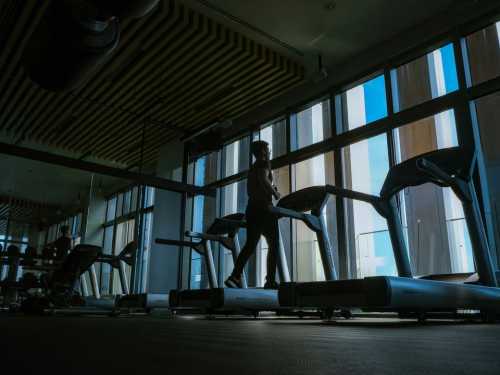From Jim Gavin to Pat Spillane, from Fear to Django Unchained, the now former Kerry manager opens up for the first time in five years to Tony Leen on the highs, the lows, the frustrations, and the future
I
What is it that elevates that memorable tete-a-tete between Pacino and de Niro in Michael Mann’s crime thriller, ‘Heat’? The dialogue or the chemistry between the characters?
The intriguing one-upmanship, the unspoken conversation, reacting to the each other’s every move.
Scanning each other like an MRI, as the director described it.
A scene never rehearsed but prepared for in infinitesimal detail by heavyweights. “If de Niro’s right foot, sitting in that chair, slid backward by so much as an inch, or his right shoulder dropped by just a little bit, I knew Al would be reading that,” Mann said later.
“Gaining an edge is why they’ve chosen to meet.”
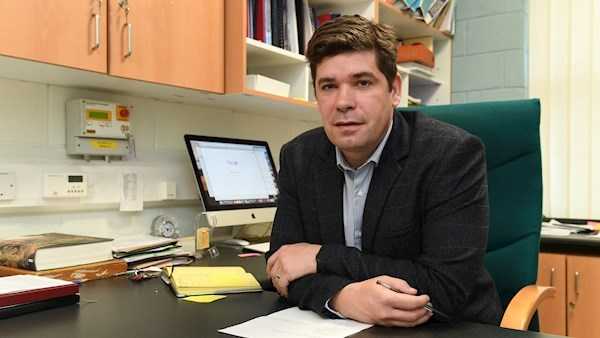
Eamonn Fitzmaurice, now principal at Pobail Scoil Chorca Duibhne, stresses his passion for the county cause: ‘Kerry always comes first. You ask about various decisions we made over the period? That was always in my head, Kerry first. Not who someone is, or what they’ve done, or what medals or profile they have. What is the best thing for Kerry next Sunday?’ Picture: Domnick Walsh
Éamonn Fitzmaurice and Jim Gavin never did, oddly. Not beyond the grass margins. Not for lunch, for coffee, at conference. Bar a couple of texts, nothing.
Two heavyweights, cordial but distant in a community like the GAA. Through six campaigns, eyeing each other as warily as they did respectfully, they never grabbed a coffee, hooked up after a game.
Joe Schmidt and Steve Hansen met for dinner and got match tickets sorted a few weeks ago, but Gavin and Fitzmaurice kept the lines parallel. Even Wenger and Fergie swapped notes at conferences.
“What Jim does differently, and successfully, is say nothing, nothing at all, over the winter time. Traditionally in the off-season, managers, players etc are a bit more open, particularly after winning an All-Ireland. Maybe willing to sit down and have a chat, be insightful. Which Jim has never done.
“Looking back over his period in charge,” Fitzmaurice reflects, “you can see why: this was never about one All-Ireland for him, or one season. Maybe when he’s finished, full stop, you might get insights, but you won’t until then.”
Fitzmaurice did a proper sit-down after winning the 2014 All-Ireland but none after. He came around to thinking this Dublin side was a different animal with a different beat, and he’d have to change accordingly. No sitting across the table from anyone.
He won’t say Dublin under Gavin became an obsession, but the Kerry manager knew beating them in Championship turned the lock on September. And radio silence was part of that strategy.
“That set the ground rules to some respects. We are all chasing Dublin, wanting to beat them.
“If you were going to beat them, it wasn’t by sitting down doing interviews or giving nuggets, particularly when you were getting nothing out their camp – either from players or management. So, we never sat down.
“He isn’t a social animal, neither am I. We wouldn’t be knocking up against each other very often.”
Dublin edged Fitzmaurice’s Kerry in an epic All-Ireland semi-final in 2013, but they wouldn’t meet again in Championship til the 2015 final. In the interim, Kerry were unbeaten in Championship.
“If someone tapped me on the shoulder in 2014 and said that was as good as it would get, I wouldn’t have believed them. First, that I’d be there that long (six seasons), but that night in 2014, you were thinking back-to-back straight away. Gooch would be back from injury in 2015, we’d be a year down the line with the young players too.
Has Dublin’s subsequent monopoly blind-sided even Fitzmaurice? It has. “But they are a unique, special group. Doing back-to-back is a huge ask, but to win four-in-a-row, no I definitely wouldn’t have envisaged that.”
What separates them?
“Personality. There’s Jim Gavin and his coaching staff, they’re excellent people, very good at what they do, and they look from the outside to be an honest group.
“But the number of big personalities Dublin has when it comes down to the big clutch moments… They just shine. They make the right decisions. They don’t just thrive in those clutch moments, they look like they live for them.
“It isn’t just one player, different players have done it at different times against us, against Mayo. Any good team has a couple of big personalities – you look at this Dublin team and you are wondering who isn’t a big personality? You don’t have to be brash to do that.
“When they get the ball, they generally do the right thing. And they’ve a ruthless, hard edge, physically and mentally. All of that comes under personality.”
II
When Dublin came down to Tralee in 2017 for a National League tie under lights, they brought with them a 33-game unbeaten streak, looking to equal a long-held Kerry record of 34.
Fitzmaurice’s side should have won — a stray free kick in injury time cost them dear — but afterwards one of the Austin Stack Park stewards told selector Mikey Sheehy that Dublin’s Philly McMahon was looking for a brush to clean out their dressing room. Mikey told him Kerry been doing that for the last three or four years.
“The players do all that sort of stuff and they’re not looking for credit either,” says Fitzmaurice.
“The night of the Galway Super 8 game in Dublin this season, we stayed in Dublin to help the recovery process for the team before the Monaghan game a week later. I wouldn’t think any other county has done that.
“The point being, we did an awful lot right. But ultimately, everything like that gets you to the starting line. When the gun goes off, you have to perform.”
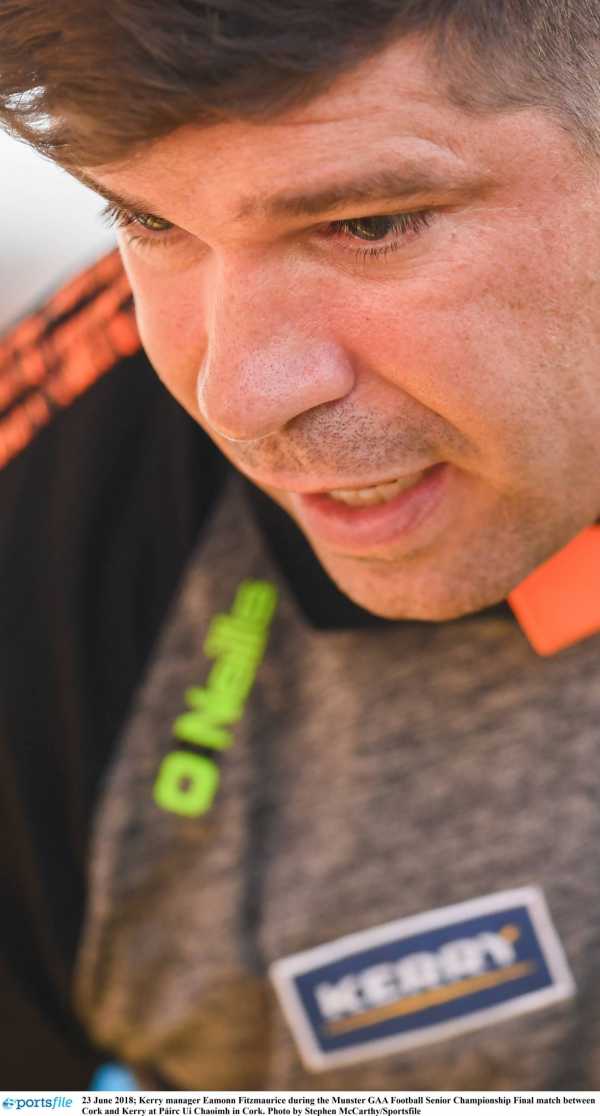
Winning was all that counted for Fitzmaurice: ‘Just win. Results are king. Everything is easy after that. The longer you stay in this position without winning – and it’s important to underline, win the All-Ireland and it’s all good – the more everything is going to be questioned.’ Stephen McCarthy/Sportsfile
Because Fitzmaurice’s Kerry only delivered one All-Ireland in the past six years, the ledger is sullied by days they came up short or didn’t perform. Such is Kerry. The court of football opinion there has no moderater. When things go wrong in the Kingdom, the middle ground collapses like a sinkhole.
The 2015 final.
The 2017 semi-final replay.
The Super 8 games last summer against Galway and Monaghan.
Over the course, they are sporadic items in the debit column, but they brought about a sudden death to half of Fitzmaurice’s six seasons in charge. At the end of this interview, he is asked to look in the rear-view mirror and offer counsel to his successor Peter Keane. It’s only afterwards he happens upon the best course for any Kerry football manager.
Win.
“Just win. Results are king. Everything is easy after that. The longer you stay in this position without winning – and it’s important to underline, win the All-Ireland and it’s all good — the more everything is going to be questioned.
“I sensed it straight away the night of the Galway game — we stayed in Dublin, trying to salvage our season. I knew there was going to be a shitstorm, you get the vibe off your family, off the backroom team, there’s stuff going on.
“My family were going to games this summer and it wasn’t a lot of fun for them. There was a lot of personal stuff aimed in my direction.
“I’m unaware as I am absorbed in the match but for them sitting there listening to that, it’s hard not to react. Blood is thicker than water and all that.
“And, it comes to a tipping point then: Am I really helping or hindering here?
“If you had a seasoned group with Declan O’Sullivan, Paul Galvin, or Darragh Ó Sé, they wouldn’t care. But a young group, trying to develop them and get them to express themselves? That environment does not help. “If I had stayed for another year, the moment we might lose a league game, it’s there again. But that’s precisely when you are trying to develop them, and I do hope — and I would be hopeful — that Peter will be given a bit of space.
Was Fitzmaurice an unlucky Kerry manager? There’s a case to be made.
He caught a break for sure in the 2014 semi-final replay epic against Mayo in Limerick, but big moments, beyond sideline control, went against him.
The McManamon-Crowley moment in the final minutes of the 2016 semi, the mindless quick free in the 2017 semi against Mayo at the death — Kerry a point in front and only needing to run down the clock into injury time. But the rap-sheet isn’t threadbare either.
Taking off key forwards in 2015 and 2016. Not starting James O’Donoghue in the Mayo replay in 2017 and going with five forwards. Handing Mark Griffin the job of marking Conor McManus in Clones last July.
The fallouts from the think-ins.
“Kerry always comes first. You ask about various decisions we made over the period? That was always in my head, Kerry first.
“Not who someone is, or what they’ve done, or what medals or profile they have. What is the best thing for Kerry next Sunday? And next year. That’s what it comes down to.
“All through my time as Kerry manager, I never thought about the standing of a player outside of our camp. It was: who was playing well, who could do a job the next day.
“Maybe it was a weakness of mine because there are players who play better than they train.
“But so much goes into every decision. Any day you lose, you look at yourself, first of all.
“In 2015, we probably had the strongest panel of my time in charge. We hadn’t lost a game in over two years in the championship. If a fella wasn’t doing it on a given day, we weren’t going to be hanging around.
“At that level, there are many marginal calls between starting or not. The worst thing you can do as a manager is do nothing. Standing there, rabbit in the headlights is the worst thing you can do.
“We got plenty of calls right, but some didn’t work. There are things I would have done differently if I was back there again, but you can’t live like that. We trust everyone who is part of the panel.
“When we needed to change things up, we trusted our finishers to go and win the game for us. It’s hard to foster that necessary collective spirit without giving players opportunities in big games.
“They weren’t random calls.”
Back to the 2015 final in a bit. Gooch chasing back after Philly and all that. 2016 first.
The One That Got Away.
“We had Dublin on the rack at half-time (five points ahead) but a lot of things, decisions, went against us that day. Kieran Donaghy and Darran O’Sullivan, both going well, got injured early in the second half. They were a big part of the game plan.
“Late on, the decision with Peter Crowley who was fouled when we were a point down. They went up the pitch and Diarmuid Connolly got a great score to make it two.
“The thing that would aggravate — and you have to be so careful about how you even discuss this because you don’t want it to come across as sour grapes — is repeated refereeing decisions going against you on big days. That is hard to take.
“In the league you don’t take much notice. When there are big decisions called wrong on big days in Croke Park, it can have a huge impact. In that 2016 semi, (referee) David Gough had a very poor game.
“Inconsistency between referees is one thing, but from the same ref in the same game? That’s the one that’s really frustrating. He admitted the mistakes he made after, but I felt he was equally bad in the 2017 replayed semi-final against Mayo.
“But in terms of refereeing, there’s a problem and the game has become too fast and too cynical, particularly at the elite level, so it needs two referees. It’s unworkable down the ranks, because the numbers aren’t there, I know that.
“But at elite level, there’s so much being missed. The GAA’s stock answer about linesmen helping is wrong because they are rivals to the referee. They will help to a certain extent, but if things go pear-shaped for the man in the middle, there’s a good chance the other lad will be getting the call the next day.
“There were seven or eight decisions in that 2016 game against Dublin — and we benefitted from a couple as well — that belonged in a county league game. There was a throw-ball over near the Cusack Stand in the first half and a third man came in and caught it, and you’re saying ‘what’s going on here?’
“That’s the most frustrating bit of my whole time in charge of Kerry. Coming out on the wrong side of big calls.
“We got breaks at the Gaelic Grounds in 2014 against Mayo but two wrongs don’t make a right. I’d prefer we didn’t get the breaks — not the breaks, the correct calls — that night in Limerick but got our share over the course of the other campaigns.
“I look at rugby and they get almost all the decisions right. We don’t in the GAA. We should go to a TMO on big decisions.”
Most of the damage in the 2015 final grind was self-inflicted.
“The better team won, we didn’t perform but we stayed chasing Dublin the whole way. With a small bit of luck, we could have got a draw. Where we were, with the strength of the squad, the confidence we had from 2014, we’d have loved another day, but it doesn’t work like that.
“The penalty Tyrone got at the end of the All Ireland final this year? The very same thing happened to Kieran Donaghy in the 2015 final, but it was a closer game then and wasn’t given. But we were just about hanging in there.
“On the Gooch-Philly McMahon thing, that should not have happened. Colm was playing inside. In both semi-final games against Mayo, Philly was on Aidan O’Shea and he was driving up the pitch causing havoc. Johnny Buckley was playing centre-forward for us in the final, and when Philly went, he was Johnny’s responsibility.
“Cian O’Sullivan wasn’t going to go — he was sitting and sweeping — so when Philly went, Johnny was to track him, and Colm was to pick up Cian. Colm wasn’t supposed to go behind the halfway line.
“It was something that happens in a game, and in the helter-skelter nature of these things — and the fact we were under pressure — that was lost. But that was the plan, and Gooch was reminded of it in the first half by (maor foirne) Pádraig Corcoran.
“Players react differently, they have to have the freedom to play it as they see it. We always trusted them when they crossed the white line. If the decision is right you pat them on the back, if it’s wrong, then you have a discussion afterwards.”
III
He’s still only 41 and Fitzmaurice has built up this vault of knowledge and experience, of cutting-edge preparation and big-match performance. And he may never use it in such a crucible again.
“Inter-county wise, I wouldn’t be sure I’d ever go back to that level again, or that I would look to. I think that’s my lot for a few different reasons. I spent six years managing Kerry and it was an amazing experience. What I loved was working with players, the nitty-gritty, getting stuck into things. Innovating, seeing it work, seeing it not work and wondering why.
“Throwing it out there, trying to tweak it. Saying ‘lads, that worked better in my head, so we’ll leave that one’. We all loved that. When things come off, it’s very fulfilling. Like we tried a couple of things in the league this year, some worked, others didn’t.
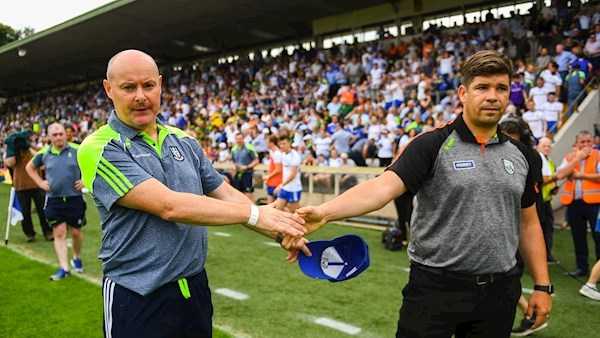
Monaghan manager Malachy O’Rourke, left, shakes hands with Fitzmaurice following their drawn Super 8 clash in July, 2018. Fitzmaurice has huge regard for O’Rourke, commenting: ‘Monaghan are a brilliant team and they are coached brilliantly by O’Rourke.’ Picture: Ramsey Cardy
“When we first did our press of Dublin kicks-outs (for the 2016 All-Ireland semi), that was one of the most enjoyable things we worked on. That and departing from the way we normally played when preparing for the 2014 final against Donegal.
“Someone in the press room said after the ’16 semi, ‘why didn’t ye stay doing it?’, and I bit when I shouldn’t have and said ‘you can only press when we kick the ball dead from a free or a 45’.
“Cluxton is so quick with the out-ball that if you go aggressive press, he’ll have the ball gone out and you’re all out of shape. You only think about this stuff when you’re inside in the middle of it in training.
“Ok so we want to set this press, but when can you set it? Only when we control the ball and kick it dead. We had to have our half-back line pushed all the way up to the half forward line.
“But if Cluxton controls the when of the kickout, we were certain to fall between two stools. The problem that day in the second half was that we only got one free within range of the posts, so we couldn’t set the press as we wanted to.
“In 2017, we got criticism for not starting James (O’Donoghue) in the Mayo replay, and for going with a sweeper. From a draw to a replay, we were generally very good making the adjustments that helped us get it over the line.
“For that replay, we were going with five forwards and employing the system we had used in the league final against Dublin that year (which Kerry won). With seven backs, we ran the ball more than normal from defence. I’m not sure people even realised we had played a sweeper in that (Dublin) game, it wasn’t picked up in the media.
“The perception, especially in Kerry, is that the sweeper is a defensive manoeuvre, and of course it makes you sounder defensively. But when you decide to run the ball, it gives you more bodies coming from deep, and better options for short kickouts. (Dingle newcomer) Tom O’Sullivan perfectly suited that sort of game going forward.
“We weren’t happy with the drawn performance even though it was a game we should have won. We played with the five up in the replay so Paul Geaney and Kieran Donaghy, the way he was playing, were going to start. James couldn’t play in the half-forward line. It was two from three from Paul, Kieran or James and James hadn’t played well in the first game.
“There is always a rationale, whether it is right or wrong. Why Mark Griffin on McManus in Clones this year? It would always be a form-based decision and who suited who.
“We were, in effect, playing an Ulster Championship backs-to-the-wall game in Clones, we needed a balance of experience with the new brigade. Killian Young was suspended, Tadhg Morley didn’t make it, Shane Enright wasn’t back from injury. Mark would often mark Paul Geaney in training, therefore you’d trust him to mark anyone.
“The previous week, because of the way Galway played, we kept one of our backs in place, sweeping. Peter Crowley was deep. But Monaghan didn’t set up in the same way, so we were going after the game, being aggressive, leaving space behind.
“There were times when Mark was left in one-on-one situations and you have to accept that Conor McManus is going to kick scores in that kind of scenario. When teams used face the Chicago Bulls, they accepted Jordan was going to get scores. The trick was minimising that and stopping the other four players.”
Of Monaghan, Fitzmaurice is a fan.
“Division One in the League is a very high standard. It’s unforgiving, humbling and you learn fast. Maybe you go into management thinking you’ve all the answers. Well, you learn fast that you don’t. You meet a lot of fellas with a lot of better answers than you.
“Monaghan are a brilliant team and they are coached brilliantly by Malachy O’Rourke. He is excellent at adapting to what the other team is doing. When there is something different thrown at him, on the fly, his responses are really good.
“You learn fast there’s a lot of very good people out there. But generally, for Championship, we had our work done.”
IV
In the beginning, there were a couple of baselines. Non-negotiables, even for an inter-county rookie like Fitzmaurice.
Can’t lose a championship game in Killarney.
Can’t lose a championship game to Cork in Croke Park.
Can’t get relegated from Division One.
And then they lose four on the bounce in Division One in his first few months as Kerry manager. Rattled? Not a bit.
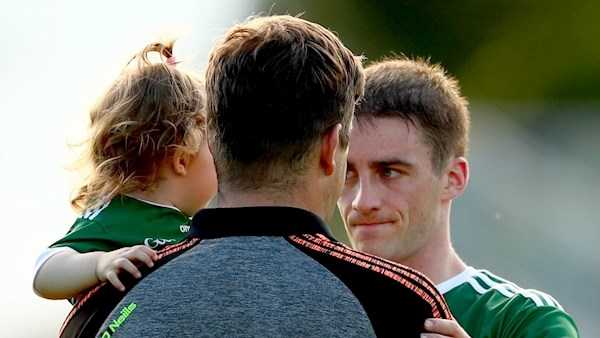
Below: Fitzmaurice chats to Stephen O’Brien after defeat to Kildare in the Super 8 clash in Killarney led to Kerry’s All-Ireland elimination, and Fitzmaurice’s resignation. Picture: James Crombie
“I knew we were doing too much right, both within the management and backroom team, for us to be fearing we were out of our depth. There was a lot of injuries, new players. Three of the first four games were away and the only home game was against Dublin.
“The fourth loss, Donegal away, was a horror show. We thought we’d the corner turned with the performance the previous week in Kildare, but Ballybofey was the worst. That was a long journey home. Murph (Diarmuid Murphy) and I watched Django
Unchained on the bus home. Apt. Four played, four lost. We were bruised but very determined. I didn’t want us to get relegated, in terms of the following season, we didn’t want to lose the learnings you get in Division One.
“Even on the bus to that game in Ballybofey, I was getting anonymous text messages saying I was the worst Kerry manager of all time. And that was before the performance up there! That’s why I regret mentioning about those letters and that sort of stuff when I stepped down. I felt the point was missed completely.
“That became the story. I had a bee in my bonnet about a player getting a letter telling him to jump off a cliff. That was a step too far.
“I was asked a question and I said I’ve a boxful of them, which was wrong because that became the story. I didn’t want that, feeling sorry for me. I’ve been getting those letters from locals more than happy to sign their name way back when I was playing hurling with Lixnaw! That’s as old as the hills.”
The trick was to stay cool, hang tough, stay believing and ride out that storm. By way of example, Fitzmaurice cites what has happened across the border. To be categorised under The Demise of Cork.
“We always approached Cork games diligently. We won six Munster titles in a row and while that doesn’t rock everyone’s boat, that was important to me.
“It’s part of a Kerry man’s DNA to be wary of Cork. We were surprised to beat them handily in the Páirc this year, but we played very well. Cork’s problem has been that they don’t tend to back up progress.
“In 2017, they should have beaten Mayo in Limerick. I was there. It was just (lack of) experience at the end cost them.
“But a big mistake they made, in my opinion, was getting rid of Brian Cuthbert. He was building something.
“In 2014, they hammered us in the league, and people forget in the league final of 2015, they were eight points up on Dublin at half-time. We played them in the Páirc in 2014, they were raging favourites, and we clicked that day.
“James (O’Donoghue) had a massive game and it kick-started our summer. Cork had the quarter final against Mayo, lost by a point and there was a situation, if I remember right, at the end with a free that Colm O’Neill tapped over in the belief there was more time left.
“In the 2015 Munster final, you are talking about luck. Kerry didn’t play well, we were poor on the line, got a soft penalty and got out of jail with an injury time point from Fionn Fitzgerald. We won the replay, and Cork had to play Kildare a week later. Kildare got the hop on them, and that was it for Cuthbert.
“Whereas if you looked at the body of work and not the individual results, there was a lot of very good signs, or so it looked to me. It looked like the Kildare result gave some people the opportunity they were looking for. But look at the results. It has gone downhill since.”
There have been a few overtures from clubs about 2019, but he can save them the bother.
“I’m involved with the school team. That’s enough. From my time as a Kerry minor, I’ve been involved with the county every single year from 1994. Minors, Under 21, seniors, senior selector, Under 21 manager, senior manager.
“My whole adult life since 16 I’ve been involved with Kerry. I want to spend time now with my family, my siblings, my parents, Tina’s parents.
“Their generation has lived through such societal change over the last 70-80 years (Fitzmaurice taught history at PS Chorcha Dhuibhne before his appointment as principal a couple of months ago). I’d love to sit down and interview them because they’re such a resource, and treasure trove of information and experience.
“I want to excel at my new job and I want to lower my golf handicap. I have a few little projects in mind that I would like to develop and pursue. I’ve been on a fantastic journey with Kerry, but I want to travel a lot more now. A different sort of journey.
“That was something I mentioned to the lads in the dressing room after the Kildare game. I am from a small hurling place in North Kerry, I was the first person from Lixnaw to play football with Kerry. To go from that, which was the biggest of big deals, to winning All-Irelands, to being in charge of Kerry, is surreal stuff.
“I’m very satisfied and secure with my whole time involved with Kerry, both as a player and a manager. There were good days, bad days, I gave it everything I had. I tried everything. I was always very respectful of the jersey as a player and afterwards of the manager’s position. I feel strongly about that. That’s why I can move on without a backward glance.”
V
He would seem an obvious candidate to join the ranks of the commentariat, but not yet. He took a Twitter sabbatical during his six years on the front line and doesn’t have much appetite to return to social media and its destructive influence on teenagers.
The Kerry players drove the absence of phones in and around the dressing room, he says — ‘banned’ is too strong a word — but that’s not to say he didn’t feel grey at times arriving into training.
“I like the in-depth stuff, the material you can get your teeth into, that gives you a better understanding of a subject. That’s not Twitter. The biggest and best thing I find being away from social media is the space and time to think. How much of that happens these days with all of the mindless scrolling and sharing?”
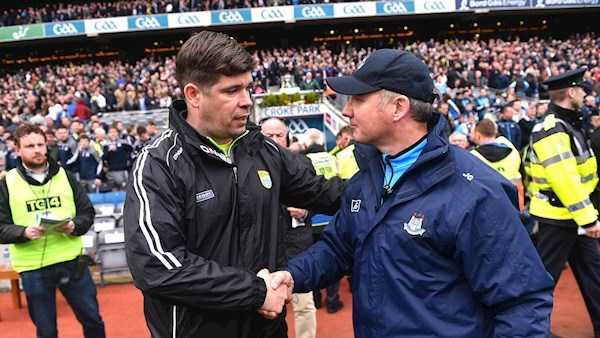
Eamonn Fitzmaurice shakes hands with Dublin manager Jim Gavin following Kerry’s victory in the the Allianz NFL final in April, 2017 in Croke Park. Kerry later went on to lose to Mayo in the the All-Ireland SFC semi-final replay in Croke Park. Picture: Ramsey Cardy/Sportsfile
He’s back reading newspapers, and he’s enjoying that. On occasions, he despairs at the level of GAA punditry, the shallowness of the analysis, especially on television. Again, he goes beyond for comparison.
“Gary Neville was looking at the case of Anthony Martial recently on Monday Night Football. Deep analysis is still very accessible when delivered by someone like Neville. Martial puzzled him. He watched him in the flesh and went digging deeper with his stats.
“He came to a very interesting conclusion about the (ineffective) runs he was making off the ball, and how they could be improved if they were between the right-back and centre-back. He was comparing his kms against Mane and Hazard and I sat there thinking ‘now that’s a decent bit of analysis. Whether it’s right or wrong, it’s proper analysis.
“That doesn’t happen in the GAA. The level of GAA analysis, especially on the mainstream tv shows is poor. It has improved but overall, it’s poor.
“In general, punditry seems to be a race to the bottom on social media in an effort to stay current and relevant. In place of cutting-edge analysis is a controversy-first model.”
A few of his compatriots weren’t slow to cut his legs off either as Kerry manager. “It’s disappointing when you see players you soldiered with displaying more loyalty to a newspaper or broadcaster than someone they were in the trenches with, but that’s the game.
“Spillane had a good few pops,” Fitzmaurice nods.
“Look, when you’ve eight All-Ireland medals, you can pretty much say what you want. Pat had plenty to say about players he won those All Irelands with when they were managing Kerry, so I wasn’t foolish enough to think he was going to spare me.
“What amuses me though is the way he will send the odd text message either preceding or following a lambasting.
Right up to the final game of a truncated summer at home to Kildare, Fitzmaurice prepped assiduously. The frustration is that over the last two years, Kerry got no championship crack at Dublin and Jim Gavin.
This season he handed over a lot of the video reviews to the players – ‘outstanding and very powerful’, he says – but that last and ultimately meaningless Super 8 win over Cian O’Neill’s side never made it to review.
Fitzmaurice hasn’t even watched it. When he left that dressing room, he stopped it dead. The team went for food in the Killarney Towers and he went home to Tina and their Faye (2). Their second child is due in January.
The next day he met the players for farewell beers in Lixnaw. They were all there. A good day. And not a backward glance.
Fitzmaurice doesn’t need anything like the six years he had managing the county know that tunnel vision is a pre-requisite for the role Peter Keane has taken on. Already the new man has culled some of last year’s panel and offered an open door on training to his demanding natives.
“I’ll be interested to see how that one (opening up training to the public) works out,” Fitzmaurice smiles.
“My thoughts on that one are known. But that’s the beauty of the job. You get to make calls like opening or closing the gates for Kerry training. Peter’s been very successful, and he knows he must be his own man. In Kerry, it’s especially important because a lot of people will come at you with their opinions and forthright views. If you are wavering in your thinking, it will tell very quickly with the players as well.
“I think he will do a great job.”
Sourse: breakingnews.ie


